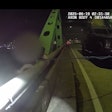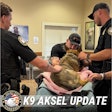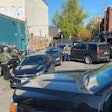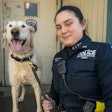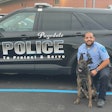Well, another year has gone by, again. There have been plenty of long days and the days off have seemed too short. It's been an eventful year, especially within the past few months. Recent events have shown us just how much we have counted on security and just how important it is to watch our backs and always keep on the alert. The same is true of gang units investigating gangs.
Nationally, violent crime has been reported to have decreased somewhat. I don't think we have experienced a paradigm change in violent gang crimes; rather, this may be one of the many complicated cycles that national crime rates go through. Although crime is reported to have decreased, this does not mean we should let our guard down.
In fact, in the Southern California region, there was some indication that violent gang crime was going up, not down. Some criminal justice researchers felt there were two reasons for this.
1) An influx of gang member criminals recently released from prison went right back into their neighborhoods. Once there, these prison veterans, now older and more experienced gangsters, began to take over their neighborhoods. Some local police officers even confided to me that they thought these older gang members were becoming the cadre of new gang leaders.
2) The word on the street was "the cops are moving out." The statement was a direct result of the dismantling of the LAPD CRASH units and the decision to replace them with new gang units operating under new guidelines. From the street perspective, the police had begun to leave the area along with the intense CRASH style gang policing. This is not the image we want to project. Yet it's happening nationwide.
Gang Units Are Losing Support
Gang investigators have told me that across the country gang units are decreasing in size or being shut down altogether. The official reasons given were that gang crime was down or that gang crime was almost gone. I don't buy that.
We all know politics are involved, but is it really a good idea to downsize or fold up shop? I think there is some good evidence to say, "No." I realize that the money issue is paramout in police administrators' minds and running a gang unit appears to be costly. But is it really? I would think the quality-of-life factor for the community you serve would be paramount. Saving one life, preventing one gang shooting or one stabbing is well worth the effort and money. I've often heard people say, "Violent gang crime is down, so we don't need the gang unit" or "The gang crime rate has dropped, so the gang unit doesn't need to be so large." These are simply justifications for closing or downsizing gang units.
Gang Crime Won't Go Away
Despite the reports and trends, there are many reasons not to downsize or eliminate gang task forces. The first and most obvious reason is that gang crime is simply not going to go away. Even if gang crime has decreased, there is a chance it may increase again, especially if gang units aren't there to closely monitor them. Street gangs will never entirely disappear. You know gang expertise will be needed, no matter how much gang-related violent crime may decrease.
I would agree that many areas of the country have seen an apparent decrease in violent gang-related crime. But let's be realistic. How much of the crime that occurs is really reported to the police? Some academic estimates indicate that only one third of crimes committed are reported. The implication for us in the criminal justice profession is that even though reported crime is down, we can't assume that unreported crimes are decreasing. Even if they were, estimating that two-thirds of the crime that is committed goes unreported, are we really safer?
Although violent crime may have decreased, an increasing number of gangs have moved into committing non-violent crimes. While they do not involve death or assault, these crimes are costly and need to be investigated by those in the know, especially since they can be difficult to track.
Examples of these crimes include check and credit card fraud, which usually carry only misdemeanor penalties, so there is little to chance and much to gain for these gangsters. For example, a clique of the 18th Street gang based in Los Angeles was once a major supplier of counterfeit bus passes. Hundreds of thousands of dollars were at stake. Not bad for a street gang.
Some street gangs have gotten more involved in another highly popular non-violent crime: drug sales. There is some evidence that ecstasy, methamphetamine, cocaine, PCP and LSD, which are sold at rave parties, are sold by gang members. This is just another example of how a street gang can focus on non-violent crime. Gang members have also been involved in prostitution operations, extortion and the smuggling of undocumented aliens into the country. Yes, for some gangs, business has changed.
Business has changed with the advent and expanded use of the Internet, as well. Many street gangs now use the Internet to recruit, communicate and spread their messages. A few even use the Web to plan their crimes. As more and more of mainstream America becomes computer literate, so will our street gang members. An example of computer savvy gangsters are the many older street gang members who have joined forces and formed new gangs that operate almost like a traditional organized crime group, using the Internet as an anonymous way to communicate. The gangs are very mobile, small in size and focus on a financial turf. Investigating cases can be difficult and costly. The maturing street gang population in the country may be larger than we think. Someone will need to investigate crimes committed using computers and the Internet, which can be difficult, especially for those not familiar with gangs.
What If Gang Units Disappear?
No matter what I think, the ultimate decision to downsize or eliminate gang units comes from our chiefs and city administrators. So if a downsize does occur or a dismantling happens, what can be done? There are several strategies for continuing with gang investigations outside of gang units.
Gang investigators, if rotated out or re-assigned, can still work gangs from the street. As a patrol officer, nothing prevents you from working gang cases and collecting intelligence during slow times or using your expertise to investigate a crime you are called to. Many of the finest gang officers I know work the streets on a daily basis. Going back to patrol can be a good thing.
A seasoned gang investigator has a lot to share with patrol officers. Expertise and knowledge of local gangs can and should be easily shared with patrol partners and between shifts. The more people who know about the types of gangs and their customs and practices, the easier it will be to investigate a gang crime.
The expertise that was learned and developed in the gang unit can also be used on the streets as a patrol officer. For example, a veteran gang investigator could write a search warrant as a patrol officer. Why not write up a short training bulletin for the patrol shift or the department?
Work with other community members, as well. School Resource Officers have become great collectors of data and sometimes have been the first to identify changes in gang trends. They usually see it with the students they know and work with at school. They can be a great resource to a police officer investigating a gang-related crime.
The gang sub-culture is dynamic. Trends, customs and practices can and will change. For some street gangs there may be radical changes. For others, unless you know the gang, there may appear to be no change at all. As gang trends change within your jurisdiction, a qualified police officer should be monitoring and recording those changes. Gangs will continue to commit crimes, so we will continue to need gang officers, whether they have that official title or not.
With all that has happened on a national basis, working street gangs might not seem very important. But it is. Police officers like you and I do make a difference, a big difference. Remember that, and may you all have a safe and joyous holiday. Take some time off and take care of yourself. Be safe.
Al Valdez is an investigator for the Orange County (Calif.) District Attorney's Office and author of the book Gangs.








